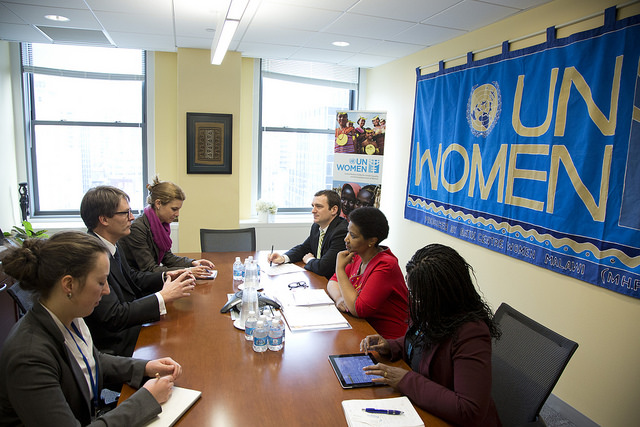The emphasis on the role of women to prevent war and conflict may have arisen because of women’s frustration at the failure of the Security Council to sufficiently implement the October 31, 2000 Security Council Resolution 1325. This resolution reaffirmed the significant role for Women in the prevention of conflict.
In the decade before 2000 states had used various guises to justify the Invasion of other states; For example, the guise of “human security” was used to justify the invasion of Iraq in 1991, then “humanitarian intervention” was used to justify the invasion of Kosovo. Since 2000, the invasions continue and only the guises have changed: it was “self Defence” (Art. 51) to justify the invasion of Afghanistan in 2001, then “Pre-emptive/preventive” attack to justify the invasion of Iraq in 2003, finally it was “the responsibility to protect” to justify the intervention in Haiti in 2004, and the invasion of Libya in 2011. Even in 2013, after all the previous guises had been discredited, a new guise was proposed , the “will to intervene” which had just been waiting to be used to justify an intervention into Mali in 2013.
In almost all the actual or proposed interventions, there was a rush to go to Chapter VII of the Charter of the United Nations; This Chapter purports to sanction the legality of a military intervention.
But what might have happened if women were significantly participating at the high level meetings of the UN Security Council?
Women might have been so bold as to propose the deligitimization of war and might have said: “Given the social, economic, ecological, health psychological consequences of war, under no circumstance or condition is war legal or just.”
They also might have proposed that rather than going to Chapter VII of the Charter of the United Nations, that the Council should proceed to Chapter VI — The Pacific resolution of Disputes. Article 33 of Chapter VI affirms that:
the Parties to any disputes, the continuance of which is likely to endanger the maintenance of Peace and Security, shall first of all seek a solution by negotiation , enquiry mediation, conciliation , judicial settlement…or other peaceful means.
Also the women might have proposed adherence to 36.3 of Chapter VI: where it is stated that:
The Security Council should also take into consideration that legal disputes should as a general rule be referred by the parties to the International Court of Justice in accordance with the provisions of the Court.
Redefining Security
At the 2014 CSW, There were also many side events dealing with the interrelationship of gender, peace and security.
A question arose several time about what constitutes “security.” Currently security is associated with “militarized security” or “human security” both of which have been discredited.
Perhaps a more gender-based concept of security could be an extension of Olof Palme’s concept of “common security” which could be has extended to embody the following objectives:
– to achieve a state of peace, and disarmament through reallocation of military expenses and the delegitimization of war
– to create a global structure that respects the rule of law and the International Court of Justice;
– to enable socially equitable and environmentally sound employment, and ensure the right to development and social justice;
– to promote and fully guarantee respect for human rights including labour rights, women’s rights civil and political rights, indigenous rights, social and cultural rights — right to food, right to housing, right to safe drinking water and sewage, right to education and right to universally accessible not for profit health care system;
– to ensure the preservation and protection of the environment, the respect for the inherent worth of nature beyond human purpose, the reduction of the ecological footprint e move away from the current model of unsustainable and excessive overconsumption and from furthering the cult of war.
Common security through the adherence to the rule of international law could lead to the fulfillment, under Security Council 1325 — of the important role of women to prevent war and end the violence against women that is both a result and a tool of war (this was proposed by the Canadian Voice of Women for Peace in a CSW 58 petition — confronting militarized security and delegitimization of war).
Exposing and countering the destabilizing of democraticaly elected states
Women might also have proposed a Draft Declaration Countering the Destabilization of Democratically Elected States:
AWARE that the foreign state or states call for the reestablishment of democracy, in the targeted state, after years of oppression;
Cognizant of the fact that there has been evidence over the years of powerful states or a powerful Coalition of states engaging in activities which have either led to a coup d`Etat or to “regime change” in a targeted state;
Aware that tactics have been used by foreign states to propose that producers, in a target state, increase inventories and export goods in order to create a scarcity of goods;
Aware also that strategies have been used by foreign states to dismantle infrastructure, particularly energy systems of the targeted state so that the citizens will blame the government for negligence and inefficiency;
Concerned that government-funded NGOs will be inserted into the targeted state to declare that the targeted state is denying freedom of speech and of the press and cite the 1994 Declaration of Chapultepec, and to instil fear of the elected or the to be elected government.
Noting that foreign governments will seek out foreign-educated opponents of the government and the opposition party leader, in targeted states and work with them to organize rallies and instigate conflict.
(Inspired by Wikileaks leaked document about destabilization in Venezuela and by La Prensa Grafica in El Salvador.)
Would Wars, interventions, and destabilization have been prevented? No one will ever know!
Image: flickr/UNWomens




